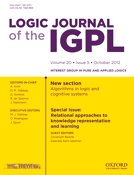
LOGIC JOURNAL OF THE IGPL
Scope & Guideline
Illuminating the Nuances of Formal Systems
Introduction
Aims and Scopes
- Mathematical and Philosophical Logic:
The journal publishes research that delves into the foundations of mathematical logic, exploring topics such as proof theory, model theory, and the philosophical implications of logical frameworks. - Computational Logic and Algorithms:
A significant focus is placed on the application of logical principles in computational settings, including algorithm design, complexity theory, and the development of efficient logical systems. - Logic in Artificial Intelligence:
The intersection of logic and AI is a core area, with research dedicated to logical reasoning, knowledge representation, and the application of logic in machine learning and natural language processing. - Non-Classical Logics:
The journal also emphasizes research in non-classical logics, such as paraconsistent logic, intuitionistic logic, and modal logic, examining their properties and applications. - Applications of Logic in Real-World Problems:
Research articles often highlight the practical applications of logical theories in diverse fields, including cybersecurity, data science, and cognitive science.
Trending and Emerging
- Machine Learning and Logic Integration:
There is a notable increase in research that integrates machine learning techniques with logical frameworks, exploring how these fields can complement and enhance each other. - Logic for Cybersecurity:
Emerging themes in logical applications to cybersecurity are gaining traction, with a focus on using logical reasoning to detect vulnerabilities and enhance system security. - Dynamic and Context-Aware Logics:
Research on logics that adapt to changing contexts or incorporate dynamic elements is trending, reflecting the need for logical systems that can handle real-time data and interactions. - Logic in Social Networks and Information Systems:
The application of logic to analyze social networks and information systems is on the rise, particularly in areas like misinformation detection and data privacy. - Abductive Reasoning and Explanatory Models:
There is an emerging interest in abductive reasoning and its application in creating explanatory models across various disciplines, indicating a shift towards understanding complex phenomena.
Declining or Waning
- Traditional Propositional Logic:
There has been a noticeable decline in papers focused solely on classical propositional logic, as researchers increasingly explore more complex and nuanced logical systems. - Basic Modal Logics:
Research on basic modal logics appears to be waning, with fewer articles dedicated to foundational modal principles, likely due to the shift towards more advanced and hybrid modal frameworks. - Static Logic Systems:
The exploration of static logic systems has decreased, as the community moves towards dynamic and context-aware logical frameworks that better address real-world complexities. - Historical Perspectives on Logic:
Papers that provide historical analyses of logical systems or philosophers' contributions have become less frequent, suggesting a shift towards contemporary applications and innovations.
Similar Journals
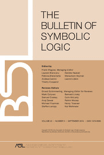
BULLETIN OF SYMBOLIC LOGIC
Fostering Intellectual Discourse in Symbolic LogicBULLETIN OF SYMBOLIC LOGIC, published by Cambridge University Press, is a distinguished academic journal that serves as an essential platform for the dissemination of research in the realms of logic and philosophy. Since its inception in 1995, this journal has progressed through its convergence years and remains committed to fostering intellectual discourse among scholars. With a 2023 ranking in the Q1 category of Philosophy and a Q3 classification in Logic, it continues to uphold its reputation as a significant contributor to the field. While operating under a traditional subscription model, the journal dedicates itself to publishing high-quality articles that explore foundational issues, advanced theories, and innovative insights in symbolic logic. Researchers, professionals, and students will find invaluable resources within its pages, particularly as it ranks favorably among peers, with noteworthy standings in Scopus rankings. For those seeking to deepen their understanding of logical frameworks and their philosophical implications, BULLETIN OF SYMBOLIC LOGIC is an indispensable resource.
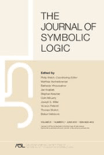
JOURNAL OF SYMBOLIC LOGIC
Pioneering Innovations in Symbolic LogicThe JOURNAL OF SYMBOLIC LOGIC, published by Cambridge University Press, stands as a leading platform for scholarly discourse in the realms of logic and philosophy. With a rich history dating back to 1938, this esteemed journal is dedicated to presenting cutting-edge research that pushes the boundaries of knowledge within symbolic logic and its applications. In 2023, it proudly holds a distinguished Q1 ranking in both Logic and Philosophy categories, reflecting its high impact and relevance in the academic community. Researchers and academics benefit from its rigorous peer-review process and contributions from leading scholars worldwide, ensuring the dissemination of high-quality research and critical theories. While the journal currently does not operate under an open access model, it remains a pivotal resource for professionals seeking to deepen their understanding of logical theories and philosophical inquiries. Explore the JOURNAL OF SYMBOLIC LOGIC to engage with scholarly articles that challenge conventional thought and inspire future research.

International Journal of Fuzzy Logic and Intelligent Systems
Exploring Innovative Pathways in Intelligent SystemsInternational Journal of Fuzzy Logic and Intelligent Systems, ISSN: 1598-2645, is a prestigious journal published by the Korean Institute of Intelligent Systems, dedicated to advancing the fields of Artificial Intelligence, Computational Theory and Mathematics, Computer Science Applications, Logic, and Signal Processing. Established to foster interdisciplinary research, this journal has quickly established its reputation, reaching a respectable Q3 quartile ranking across multiple categories in 2023. It serves as a vital resource for researchers, professionals, and students, offering insights into cutting-edge methodologies and innovative applications of fuzzy logic and intelligent systems. With a focus on disseminating high-quality research, the journal attracts contributions that drive the evolution of intelligent technologies and their practical implications. Published from South Korea, the journal is positioned to impact the global community, facilitating a deeper understanding of intelligent systems in various domains.
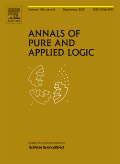
ANNALS OF PURE AND APPLIED LOGIC
Elevating the Standards of Logical DiscourseANNALS OF PURE AND APPLIED LOGIC is a premier academic journal published by Elsevier, specializing in the foundational aspects of logic since its inception in 1974. With a strong commitment to disseminating original research, the journal focuses on both pure and applied logic, making significant contributions to the fields of mathematics and computer science. The journal is recognized for its rigorous peer-review process and is currently ranked Q1 in Logic, reflecting its status among the top-tier publications in the discipline. Researchers will find valuable insights and advancements in logical theory and practice in its pages, while the journal's Scopus ranking further positions it strategically within the mathematical logic community. Although it is not an open-access publication, it offers convenient access options for institutions and subscribers, ensuring a wide reach for groundbreaking findings. The ANNALS OF PURE AND APPLIED LOGIC continues to be an essential resource for professionals, students, and academics alike, facilitating a deeper understanding of logical frameworks and their applications.
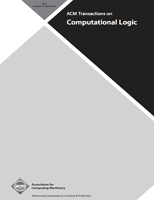
ACM Transactions on Computational Logic
Elevating Standards in Logic and Computer ScienceACM Transactions on Computational Logic, published by the Association for Computing Machinery, is a premier journal dedicated to the advancement of computational logic, spanning the disciplines of computer science and mathematics. With its ISSN 1529-3785 and E-ISSN 1557-945X, this journal has established itself as a vital resource within the academic community, particularly noted for its influential contributions reflected in its 2023 scopus rankings. The journal holds notable quartile rankings, achieving Q1 in the fields of Computer Science (miscellaneous) and Logic, alongside Q2 in Computational Mathematics and Theoretical Computer Science, indicating its prestigious position in the respective categories. Researchers, practitioners, and students can access a wealth of rigorous research articles that delve into both theoretical frameworks and practical applications of computational logic, fostering innovation and collaboration in the field. As it converges towards its 2024 objectives, ACM Transactions on Computational Logic continues to uphold a commitment to excellence and impact, striving to shape the future of computational theories and methodologies.

Mathematical Foundations of Computing
Advancing the Boundaries of Computational MathematicsMathematical Foundations of Computing, published by the American Institute of Mathematical Sciences (AIMS), is a distinguished open-access journal that has been actively disseminating influential research in the fields of Artificial Intelligence, Computational Mathematics, Computational Theory and Mathematics, and Theoretical Computer Science since its inception in 2009. With its E-ISSN 2577-8838, this journal is committed to providing researchers and practitioners with cutting-edge mathematical theories and methodologies that underpin modern computational practices, which is critical for advancing the field. The journal proudly holds a Q3 categorization in several relevant domains as of 2023, reflecting its contribution and accessibility amid an evolving academic landscape. By offering open access to its content, it ensures that vital research is freely available to a global audience, enhancing collaboration and innovation. Positioned in the heart of the United States, Mathematical Foundations of Computing serves as a crucial resource for advancing knowledge and fostering discussions among researchers, professionals, and students passionate about the mathematical underpinnings of computing.

JOURNAL OF MULTIPLE-VALUED LOGIC AND SOFT COMPUTING
Bridging Theory and Application in Computing.Journal of Multiple-Valued Logic and Soft Computing, published by Old City Publishing Inc, is a dedicated forum for advancing the fields of logic and soft computing. Since its inception in 2003, this journal has positioned itself as a valuable resource for researchers, professionals, and students interested in the complex interplay between multiple-valued logic systems and computational methodologies. With a broader reach into theoretical computer science, the journal is categorized in the Q4 quartiles across key areas, showcasing its role in disseminating relevant research despite its current position. This peer-reviewed publication silos essential discussions and breakthroughs that serve as a foundation for ongoing innovation in logic and computing theories. Though not currently open access, the journal continues to attract critical contributions that underscore its commitment to advancing knowledge in mathematical logic and software development through its effective symposium-like format, promoting collaboration among various stakeholders in the scientific community.

JOURNAL OF LOGIC AND COMPUTATION
Bridging Disciplines through Logic and ComputationJOURNAL OF LOGIC AND COMPUTATION, published by Oxford University Press, is a leading peer-reviewed journal dedicated to advancing research in the intersections of logic, computation, and theoretical frameworks of computer science. With an ISSN of 0955-792X and an E-ISSN of 1465-363X, the journal has established itself within academic circles, boasting significant impact evidenced by its category quartiles, including a Q1 ranking in Arts and Humanities (miscellaneous) and a Q2 in Logic for 2023. This prestigious journal emphasizes interdisciplinary approaches to understanding computational systems, hence targeting a diverse audience of researchers, professionals, and students keen on exploring provocative questions in logic and computation. Although not open access, the content is highly valuable, reflecting contemporary challenges and advancements in the field. With over three decades of published work, spanning from 1990 to 2024, the journal continues to contribute richly to the discourse surrounding logical methodologies and computational innovations, making it an essential resource for those engaged in these dynamic areas of study.

ACTA INFORMATICA
Navigating Trends in Information Technology.ACTA INFORMATICA is a prestigious academic journal published by Springer, dedicated to advancing the fields of computer networks and communications, information systems, and software engineering. With an ISSN of 0001-5903 and an E-ISSN of 1432-0525, the journal has continued to thrive since its inception in 1971 and is set to cover research up until 2024. Although it currently operates within a Q3 category in its respective fields, it is recognized for providing a platform for high-quality, peer-reviewed research, which is essential for fostering innovation and knowledge dissemination in computer science. While it does not offer an open access option, scholars benefit from its rigorous editorial standards and comprehensive coverage of significant trends and methodologies. The journal is conveniently based in New York, NY, USA, further enhancing its accessibility to a global audience. Researchers, professionals, and students alike will find ACTA INFORMATICA a valuable resource for staying abreast of the latest developments and breakthroughs in this vital area of study.
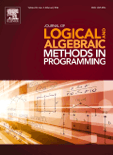
Journal of Logical and Algebraic Methods in Programming
Bridging Theory and Practice in Computational Mathematics.The Journal of Logical and Algebraic Methods in Programming (ISSN: 2352-2208, E-ISSN: 2352-2216) is a prestigious publication by Elsevier Science Inc, dedicated to advancing the fields of computational theory, programming logic, and mathematical methodologies. Esteemed in its commitment to high-quality research, this journal holds a Q2 ranking in 2023 for Computational Theory and Mathematics, and is recognized in various other disciplines including Logic and Software Studies. The journal’s open access policy enhances its visibility and accessibility, ensuring that cutting-edge research reaches a wider audience of researchers, professionals, and students. With an impressive convergence timeline from 2014 to 2025, it is a vital resource for those seeking to explore innovative algorithms and their applications in diverse areas of informatics. The Journal of Logical and Algebraic Methods in Programming represents a unique intersection of logic, mathematics, and software, carving a significant place in the scholarly discourse of theoretical computer science.